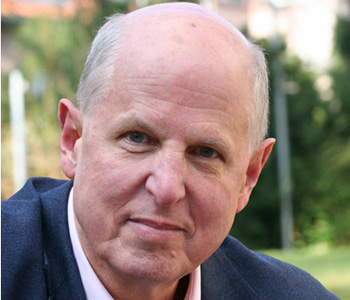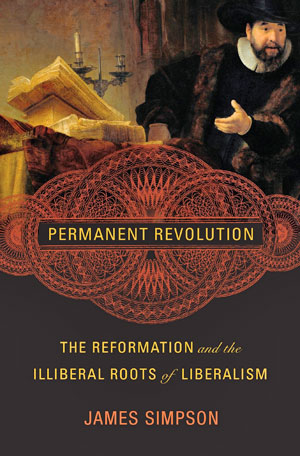
Protestants won in Northern Europe in the sixteenth and seventeenth centuries. The narrative produced by the winners was and largely remains triumphalist: Protestantism won because it foreshadowed the liberal order. It promoted the growth of individuality, now that each Christian had unmediated access to a personal God; liberty of conscience; rationality; the right to interpret scripture for him or herself; equality through the democratic priesthood of all believers; toleration; constitutionalism, and national independence. Winners make history.
In Permanent Revolution I argue that this argument is both wrong and right. It is wrong because most varieties of sixteenth- and seventeenth-century Protestantism were the opposite of liberal. They were illiberal in remarkably extreme, soul-crushing, violence-producing ways.
The triumphalist argument is right insofar as the 150 years following 1517 witnessed a historical process whereby many Protestants ended up repudiating the initial, founding doctrines of Luther and Calvin. Democracy; division of political powers; separation of church and state; free-will; toleration for minorities; liberty and privacy of conscience; artistic liberties; liberty of textual interpretation: all these cardinal features of the Enlightenment emerge from Protestant polities. They do so, however, by repudiating Lutheran and Calvinist Protestantism.
In sum, Protestant triumphalism is wrong with regard to the beginning of the Reformation centuries, and right with regard to the end of that historical period.
How did the process of repudiation occur? I make sense of that historical process by defining three broadly applicable periods of the Reformation centuries in Britain: (i) 1517-1560, the revolutionary, carnivalesque, fun period of smashing the Catholic Church and all its practices; (ii) 1560-1625, the decidedly unfun period when many Protestants discover that they are violence-producing, iconoclastic hypocrites likely damned by predestination; and (iii) 1625-1688, the period in which Protestantism divides into its illiberal, Presbyterian, Calvinist wing on the one hand, and its proto-Enlightenment, proto-liberal wing on the other.
I substantiate the argument with sections devoted to the following topics: despair; hypocrisy; iconoclasm; theater and the pursuit of “witches”; reading; and liberty.
In my reading, the Reformation is less a religious movement than a movement of illiberal revolutionary modernity. Every aspect of Reformation practice is taken up and recycled by later, political revolutionary movements that claim to usher in modernity by repudiating the obscurantist past. The following features of the Lutheran and Calvinist Reformation set the template for many future revolutions in both West and East: historical determinism; revolutionary purity and integrity of self; iconoclasm of “idols”; targeting of “superstition”; literalism; and anti-democratic claims to be introducing “liberty.”
So, modernity has two, deeply inter-related stories: a highly centralized, authoritarian version, and a decentralized, liberal version. The early Reformation expresses the authoritarian version of modernity. The end of the Reformation period expresses modernity’s liberal version.
Once we describe the Reformation as part of the story of modernization, then we understand the continuing magnetism of evangelical religion, in both the West and elsewhere: evangelical religion is a key expression of modernity, a non-reformist, non-conservative revolutionary form of modernization in every respect. As long as liberals do not understand this, they remain utterly bewildered by evangelical culture, dismissing it, with 180-degree inaccuracy, as “conservative.” It is unquestionably, and objectionably, illiberal and regressive, but it is also by far the most powerful expression of early European revolutionary modernity, which is one of the reasons it remains powerful in the United States and globally.
I came to this thesis as a cultural historian of the later Middle Ages. Enter the Reformation through, as it were, the back door of the late Middle Ages, and you are in for a shock. You discover that many cultural forms routinely characterized by liberal culture as specifically “medieval” (e.g. iconoclasm, slavery, persecution of “witches,” judicial torture in England, Biblical fundamentalism, political absolutism) were either revived by, or specific to the early modern period. Above all, you discover a massive upshot in religious persecution and violence after 1547. Suddenly, late medievalists understand, that is, that liberal modernity throws its embarrassments over the cultural back fence into premodernity (aka, here, pre-Reformation Catholic later Middle Ages).
I hope browsing readers will feel the palpable connections between the revolutionary period of the Reformation and our own times. The Introduction and Conclusion would be the places to get that feel quickly.
Instead of simplistic accounts of liberalism emerging as in a direct and pure stream from Protestantism, we understand that Liberalism is all the more precious and rich for having fought its way clear of evangelical religion. Instead of simplistic accounts of evangelical religion as “conservative,” we understand its powerful magnetism as a crucial expression of Western modernity. And instead of assuming that the liberal position will always be free of religious violence and intolerance, we understand that liberalism emerged from the same furnace as evangelical religion; the forging of the Liberal order bears the same scars as does evangelical religion. Liberalism, no less than evangelical religion, and for the same historical reasons, is easily capable of its own intolerances. Evangelical religion and Liberalism share the same DNA.
The stakes of connecting these two forces that dominate American culture and politics (not to speak of other polities across the globe) are high. We stand to reconceive the following: the history of liberalism; the relation of liberalism to evangelical religion; and, by no means least, the nature of our own modernity. The stakes of such understanding are especially high in our own moment, with liberalism in global retreat before evangelical religion, and with liberalism in the West becoming increasingly fragile as it finds itself unable to formulate persuasive models of durable, flourishing cultural cohabitation, subject as it is to its own identity-driven exclusivisms, and its default positions of institutional distrust.
Readers interested in the history of despair, hypocrisy, the image, theater and the pursuit of “witches,” reading, and liberty itself will easily find their way to those separate histories in clearly marked sections.
As a cultural historian, I work to the ideal that cultural history is ancillary to the complex history of freedoms. I also aim to write what I call “cultural etymology,” by which I designate a practice of excavating the present. The present is, if we are to be honest with ourselves, the place where most historical enquiry most urgently and frequently starts. I myself always start with the conditions of contemporary modernity, where “conditions” also designates pathology. Many cultural historians would describe their work as an act of discovery. My project is rather one of recovery, where one starts from the present and recovers immanent histories by which the present is understood, as if for the first time.
As a cultural historian, I write as, and for, both scholar and citizen.
To the scholar, my appeal is to write cultural history with long chronologies, as we try to evade the historiographical deformities imposed upon us by the standard periodic divisions of cultural history. To write either as “medievalist” or as “early modernist” is already to buy into many prejudicial presuppositions. The standard divisions of cultural history are designed so as neutralize most powerfully the interest of our fractured histories.
As a citizen, I appeal not to the evangelical, since in my experience that reader judges only from their convictions. If any evangelical is prepared to engage with me, I will be delighted, but that has not been my experience with previous books. As a citizen, I appeal instead to the liberal. I ask her or him to understand the liberal tradition more deeply, as a precious but fragile product of history. As Liberalism is in retreat worldwide, liberals need to understand their opponents, and their intimate relation with their opponents. They need to understand that they, as liberals, can be just as intolerant as their evangelical opponents, and they need to understand Liberalism less as a belief system and more as an instrument for managing potentially violent belief systems.


James Simpson is Donald P. and Katherine B. Loker Professor of English at Harvard University. He was formerly Professor of Medieval and Renaissance English at the University of Cambridge. His most recent books are Burning to Read: English Fundamentalism and its Reformation Opponents (2007); Under the Hammer: Iconoclasm in the Anglo-American Tradition (2010), which was featured in his earlier Rorotoko interview; and Permanent Revolution: The Reformation and the Illiberal Roots of Liberalism (2019), which is featured in his recent Rorotoko interview.